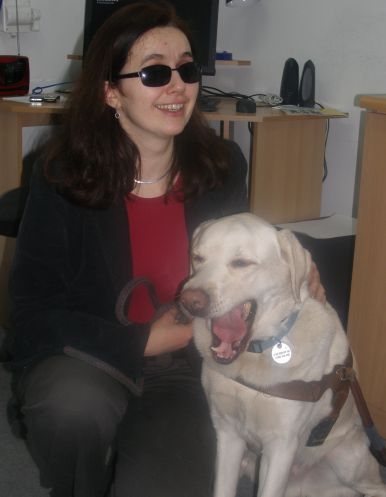Kramarz is blind. On 24 November 2007 she was trying to access to the market Carrefour with her guide dog. However, she was denied access. The dog was wearing a special sign – “do not caress – I am working” and Kramarz was holding the dog on a special leash. The applicant was stopped at the door entrance by a security officer who allowed entrance “only to the lady who does not need a dog to access the market”. The reasons of the denial were based on the cleanliness and sanitary security. Kramarz showed to the security officer a justification of her handicap and a resolution of the Warsaw Municipality Council Nr LXXVII/2427/2006 from 22 June 2006 allowing the access to premises with a specially trained and marked dog (Załącznik do uchwały Rady miasta stołecznego Warszawy). The security officer informed Kramarz that he was not interested in the paper she was providing him with, and that “his boss told him to deny access and he needs to obey”. He added that the market was a private property. Therefore, no access should be granted. Kramarz resigned further attempts to enter the market area.
On 6 May 2008 Kramarz (represented by a pro bono advocate) lodged a civil complaint against Carrefour Polska limited liability company for personal good breach by the denial of access because of her blindness. She claimed the ability to access the market, 25,000 PLN (approx. 7,000 euro) for the Foundation “Vis Maior” and the publication of official apologies in one of the most important Polish daily newspaper. The argumentation of the claim was based on the fact that Kramarz was discriminated. She was treated in the same way as a sighted person, while her situation was different. The guide dog was “replacing” her own eyes. The denial of access violated her dignity and the right of freedom of movement. The attitude and reaction of the security officer humiliated her. The denial of access to dogs was motivated by security reasons, mainly sanitary. The restriction introduced were not proportionate to the goal pursued.
The case ended by a friendly settlement reached before the Warsaw Regional Court on 28 January 2009.
The case proved the non-existence of non-discrimination Law in Poland. It also showed how ineffective the non-discrimination rules really are in cases concerning blind persons. The case is an example of a precedential case which led to concrete legal changes and changes in the practice of one of the biggest super-markets in Poland owned by the sued company. On 21 November 2008 amendments were introduced to the Law on professional and social rehabilitation and employment of blind persons from 27 August 2008, OJ from 2008, Nr 14, item 92 (Ustawa o rehabilitacji zawodowej i społecznej oraz zatrudnianiu osób niepełnosprawnych – Dz. U. z 2008 r., Nr 14, poz. 92).
The amendment of the Law introduced the notion of „assisting dog” being „a trained and marked dog, especially a guide dog of a blind or amblyopic person or a dog assisting a person with movement handicap, which enable to such a person an active participation in the social life”. Articles 20a and 20b of the amendment provide that a “handicapped person may access with an assisting dog to all public facilities”. The Law further stipulates that such an authorization is also applicable in public transport means, rail, road, air and water transport means. The condition of benefiting from such and authorization is an adequate equipment of the assisting dog – with a harness and the possession of a certificate confirming the need to be assisted by a specially trained dog. The amendment will enter into force on 19 June 2009.
Dominika Bychawska
The Observatory of Media Freedom in Poland





